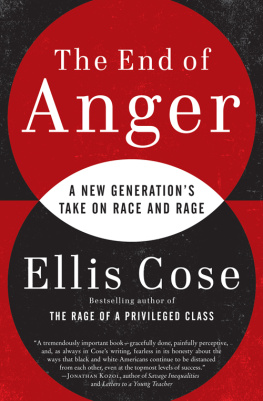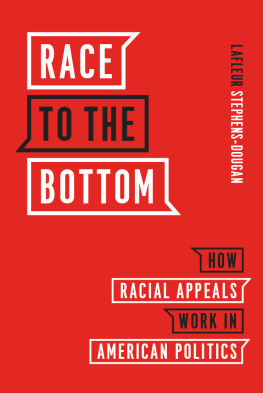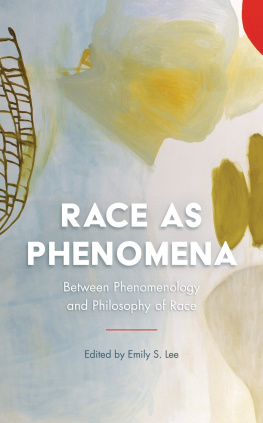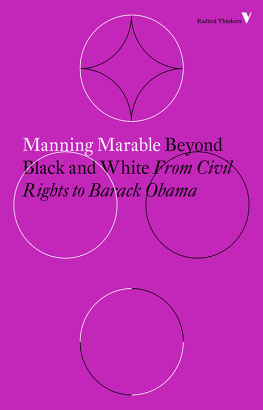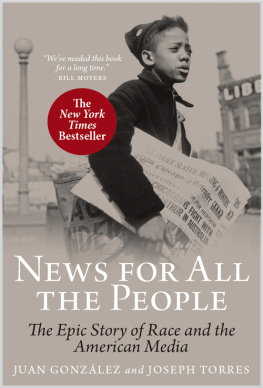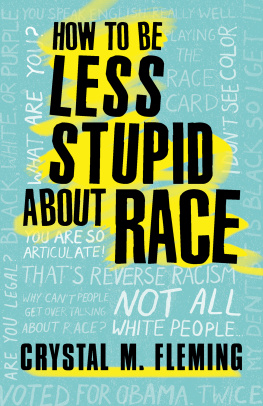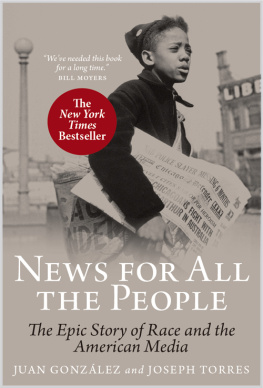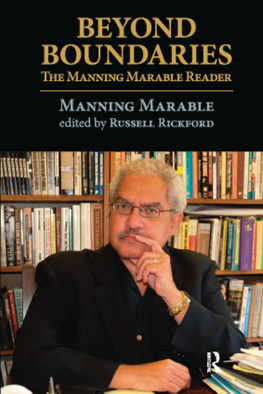First published 1997 by Transaction Publisher
Published 2017 by Routledge
2 Park Square, Milton Park, Abingdon, Oxon OX14 4R
52 Vanderbilt Avenue, New York, NY 10017
Routledge is an imprint of the Taylor & Francis Group, an informa business
Copyright 1997 by Taylor & Francis.
Originally published in the Media Studies Journal, Summer 1994.
Copyright 1994 by The Freedom Forum Media Studies Center and The
Freedom Forum.
All rights reserved. No part of this book may be reprinted or reproduced or utilised in any form or by any electronic, mechanical, or other means, now known or hereafter invented, including photocopying and recording, or in any information storage or retrieval system, without permission in writing from the publishers.
Notice:
Product or corporate names may be trademarks or registered trademarks, and are used only for identification and explanation without intent to infringe.
Library of Congress Catalog Number: 96-5598
Library of Congress Cataloging-in-Publication Data
The media in black and white I edited by Everette E. Dennis and Edward C. Pease.
p. cm.
Originally published as summer 1994 issue of Media studies journal.
Includes bibliographical references and index.
ISBN 1-56000-873-3
1. Mass media and race relations-United States. 2. United StatesEthnic relations. I. Dennis, Everette E. II. Pease, Edward C.
P94.5.M55M43 1996
302.2308-dc20 96-5598
CIP
ISBN 13: 978-1-56000-873-6 (pbk)
Contents
Ellis Cose
For reporters, race can be a treacherous subject, raising questions that go to the heart of the journalists craft, observes the author, a. Newsweek contributing editor and former Media Studies Center fellow. Today, though we live in a world that is increasingly multicultural, much of conventional journalism remains fixated on the lives of the white and the wealthy. The result, he says, is tension in the newsroom, the news product and the news consumer.
Manning Marable
The 30 years since the zenith of the civil rights movement have brought a paradox of desegregation, contends the author, chairman of Columbia Universitys African-American research center and author of numerous books on race in America. Improvements aside, U.S. race relations in the 1990s have been unambiguously negative, he writes. Media, film and educational institutions have a decisive role to play in overturning Americas pervasive images of inequality.
John J. Miller
Immigrants have always made Americans uneasy, as the associate director of the Center for the New American Community in Washington points out. That uneasiness is growing in the 1990s as new waves of illegal immigrants spill over the borders and are accused of a range of social ills. The media cant do anything about that. What the media can do, however, is exacerbate or ease these worries. It all comes down to the quality of reporting on immigrant issues.
Robert M. Entman
We have all heard that sensationalism and entertainment values are on the rise in TV news, writes a Northwestern University researcher. My studies indicate these trends arent simply professional embarrassments and frustrations for journalists. They may also be making urban America less governable, deepening the chasm of misunderstanding and distrust between blacks and whites.
Oscar H. Gandy Jr.
Everyone knows that bad news drives journalism, but the press disproportionately frames stories about blacks as bad news, a University of Pennsylvania media scholar finds in a pilot study he conducted. To the extent that the media emphasize the ways in which the distribution of social and economic risks breaks down along racial lines, he suggests, they have helped to tear us apart.
William Wong
Things are looking up in terms of how the press covers Americas diverse new Asian community, writes the author, a former columnist for the Oakland Tribune. TV coverage of Asian Americans remains spotty and sensationalized, but print coverage, while retaining some of the old polar good-bad images, has become increasingly nuanced, textured and true to life.
Dale Thorn
Forty years after Brown v. Board of Education, the fight over racial segregation has flared up again, with an ironic twistback then, blacks sued to enter white colleges; today they are fighting to keep black colleges open. Amid the gaffes and stereotypes by the media, there has been a real dearth of relatively simple, interpretive, what-it-means reporting on the Souths desegregation story, complains a Louisiana State University journalism professor.
Jimmie L. Reeves and Richard Campbell
Coverage of Americas drug wars has been marked by racism, contend the authors of a new book on how network television reports on cocaine. Journalisms discovery of crack in late 1985 signaled the beginning of a period of frenzied coverage in which the race and class contours of the cocaine problem established in the early 1980s would be almost completely reconfigured, they find.
Andrew Hacker
If Ebony is a black magazine, is the New Republic white? asks a Queens College political scientist and author. White journalists and media organizations dont see race as an essential feature of their identities, but for blacks, as the author points out, the dominant media are most certainly white. To their eyes, the mainstream media speak for a white nation, which expects all citizens to conform to its ways.
Jannette L. Dates and Edward C. Pease
There is good reason for minorities to think their perspectives are at best warped by the media or, worse, not heard at all, reflect the acting communication dean at Howard University and the co-editor. In the year that saw a black man elected president of South Africa, there is irony in the fact that apartheid still rules the information age in America.
Paul Delaney
Americas image of blacksand their own self-imageis closely tied to how they are portrayed in news and entertainment, writes the author, a former New York Times editor who now heads the journalism department at the University of Alabama. There is strong objection to many of the roles and images transmittedincluding the clown image of television sitcoms new vaudevillians, but particularly the messages of gangsta rappers about women as bitches and hos, and about guns and violence and cops.
Everette E. Dennis
To paraphrase the poet, Whats in a name? In theory, substance should be vastly more important than labeling, but, as the co-editor points out, language questions are intensely sensitive in the arena of race in America. Black or African American? Native American or Indian? To the extent that nit-picking over language interferes with coverage of vital racial and ethnic issues and problems, this debate may be counterproductive, he concludes. But it refuses to go away.
Adam Clayton Powell III
So far, at least, the electronic world of tomorrow looks pretty white, reflects a former broadcaster and technology expert. Future archaeologists, studying the documentary record of the present, would have reason to conclude that people of color were bypassed by the information superhighway, he says. Maybe it just passed over black and Latino communities, much as Manhattans West Side Highway passes overhead on its way through Harlem neighborhoods.


